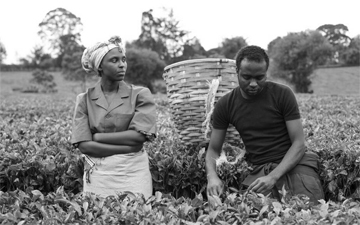
It's understandable to want to praise Stories of Our Lives, an hour-long quintet of vignettes depicting the struggles of Kenya's LGBT community, for the mere fact that it was made. As a wake-up call to the hardships endured by perfectly upstanding citizens of the East African nation, the film drives home its points with economy of storytelling and no shortage of lyrical black-and-white imagery. It's only when the omnibus film – credited to the Nairobi-based activist group The NEST Collective but actually directed by artist Jim Chuchu – decides to step on the soapbox in a more confrontational manner that its considerable charm wears off.
Fortunately enough, Chuchu, quite the Renaissance man in his home country, saves the most patronizing bits for last, which means, until it hammers home its message of tolerance, these Stories make for an eye-opening travelogue into emotional territory that feels at once specific and universal. Take, for instance, the low-key earnestness of “Ask Me Nicely,” which follows the courtship of polar-opposite schoolgirls Kate and Faith. The former, who gives off a jock vibe, is first seen dribbling a basketball, which is how she first crosses paths with the latter, a straitlaced bookworm with a tendency to cock her head to the side as if in constant inquiry about life in general.
Their courtship, first tentative, then indiscreet, eventually lands them in the headmistress' office, a school official portrayed here as a bureaucrat who's disapproving of this budding romance, but at the end of the day, can't be bothered with such trivialities, a notion driven home by the ubiquitous presence of clocks. What's most interesting here is that the fate of the girls' relationship rests more with Kate's choices than in the school's stiff-upper-lip objections. The film could have used more of this character-driven content, and is at its most effective when it does.

The second vignette, “Run,” tells an even more familiar tale of closeted angst, as twentysomething Pato gets schooled by would-be business associate Kama to watch out for the fairies in Westlands, the gay club in their part of town. (“I don't roll with fags,” Kama states bluntly.) Pato, unbeknownst to his bigoted homeboy, wants a taste of the forbidden fruit, and all the pieces fall exactly when you expect after he decides to go hang out with all those off-limits boys with the come-hither eyes, knowing he runs the risk of being spotted.
It all leads to Pato's Run Lola Run moment, neatly rendered in high-contrast monochrome that makes the movie play like Sebastião Salgado's Afterschool Special. (I wonder if Chuchu knows what “Pato” stands for in some parts of Latin America.)

Much more poignant is Athman, which introduces a triangle of sorts between three young farm workers. The titular character is a longtime friend/unrequited crush of leading man Raymond, who makes no bones about, a) his feelings for his buddy and b) his displeasure that he's banging work colleague Fiona, who's well aware of Raymond's leanings. At 16 minutes, Athman is the longest short, and Chuchu makes full use of the somewhat extended running time by taking in the pastoral landscapes, where grueling labor during working hours leads to nighttime pining for lovelorn Raymond. Again, the outcome here is a foregone conclusion, but Chuchu nails the heartache with sensitivity and grace.
Perhaps the most cohesive vignette, Duet is the only one that takes place outside of Kenya, and it follows Jeff, who is visiting Britain for a conference and has been saving up money to hire a (white) hustler for an hour. The Caucasian rent boy, initially all no-nonsense and businesslike, eventually opens up to his client, and the ensuing conversation transcends its Stanley Kramer-esque didacticism to achieve a pleasing earthiness echoed in the erotic imagery that closes the shortest and, to this reviewer, most satisfying slice of Lives.
And then, alas, comes “Each Night I Dream,” and Stories of Our Lives comes crashing down in a wave of magic realism and agitprop sermonizing. Ostensibly a chronicle of a lesbian couple's paranoia about being discovered and ostracized, the narrative is little more than a point of departure to expose the persecution that members of the LGBT community face in Kenya on a daily basis. It's all very alarming and sobering, to be sure, but it also undermines the engrossing storytelling that precedes it. Voiceover narration drives home Chuchu's plea for acceptance, as if his passionate call to protect the dignity of these lives needed to be spelled out to viewers with lowest-common-denominator urgency. It didn't.

Stories of Our Lives, which is screening for free at O Cinema Miami Beach, June 25 at 7 p.m., as a joint presentation of this arthouse, MiFo LGBT Film Festival and the Miami Jewish Film Festival, will no doubt energize and empower the community audience that shows up for it. It's somewhat unfortunate there was a stronger film here drowned out by all the well-intentioned moralizing.
For more information on the screening, go to www.o-cinema.org.
 MAIN MENU
MAIN MENU

